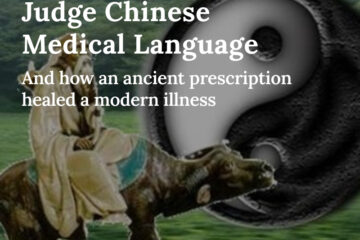Blood deficiency is one of the most common disharmonies in Traditional Chinese Medicine. Many people talk about Blood deficiency a lot but, what is Blood deficiency exactly? How can one notice it before it becomes a greater issue?
Blood Deficiency is the lack of Blood in the body and the organ networks undernourishing them and making them unable to perform their functions correctly. It can lead to symptoms like paleness of the skin, tachycardia, palpitations, and arrhythmias; scant menses, tight muscles. On the psychological side, it can cause insomnia, low self-esteem, poor memory, and even psychiatric crises.
In this article, you will learn about the concept and functions of Blood in Traditional Chinese Medicine, as well as to identify the signs of Blood deficiency and what to do about them.
Table of Contents
Blood Deficiency in Chinese Medicine
In Traditional Chinese Medicine, Blood is one of the essential components of the human body also known as textures, other textures are Qi, Jing (Essence), the Spirit (Shen), and the Fluids (Jin-Ye).
When we refer to the Chinese concept, we use capital letters to differentiate it from the most common, Western view of blood.
Many concepts in TCM include the Western concept but add something on top of it.

How Traditional Chinese Medicine Sees Blood
Blood in Traditional Chinese Medicine contains the Western view of blood as the red fluid that flows through our blood vessels, but it also includes the energetic function of Blood. Blood circulates through the meridians, nourishes the Zhang Fu organs, and is the medium of the mind. The Spirit (Shen), which translates to our psychological features and functions lies within the Blood.
Life Cycle of Blood
As we eat, the Stomach takes the food, ripens, and digests it. The Spleen distills Nutritive Essence from the food and transports it to the Lungs. The Lungs bring the air Qi and combine it with the Nutritive Essence from food to create Qi, Blood, and Jing (Essence). Blood then is propelled through the body by the Heart Qi and the Qi of the Chest.
Blood then goes on to perform its functions.
Blood Deficiency
Blood Deficiency is a disharmony that happens when the whole body or a specific organ network is not properly nourished by blood. This causes a load of symptoms depending on the level of deficiency and the affected organ.
Causes of Blood Deficiency
Here are some examples of entities that can cause Blood Deficiency:
- Loss of blood through hemorrhage: This is the most obvious one, diseases like bleeding ulcers, digestive bleeding, and excessive use of NSAIDs like acetaminophen. Hemorrhagic diseases like Thrombocytopenia, Henoch-Schönlein purpura, and others are also causes.
- Improper nutrition or malnutrition: Without a proper intake of food the Spleen cannot transform it into Nutritive Essence and Blood cannot be created.
- Deficient Spleen Qi: Following on the previous point, if the Spleen is energetically deficient, it won’t be able to extract Nutritive Essence and create Blood. This can be caused by excessive eating, obesity, and Dampness. A deficient Spleen Qi also causes hemorrhagic diseases because the Blood can’t stay inside the vessels.
- Deficient Heart Qi: The Heart commands the Blood flow through the body. If the function of the Heart is impaired, the Blood can’t reach the body or the organs like it should therefore causing a Disharmony of Blood Deficiency. Heart Failure and Myocardial Infarctions are some examples.
- Disharmonies of the Liver: The Liver stores and distributes the blood, if the Liver is damaged it won’t be able to adequately distribute and store Blood thus causing hemorrhagic diseases for example (the coagulation factors are diminished). This can be seen in hepatic cirrhosis.
Symptoms of Blood Deficiency
The clinical manifestations of Blood Deficiency depend on how serious is the deficiency of Blood, and the organs that are being affected. Sometimes it can be the main sign of the clinical case or it can happen in conjunction with other signs.
Here is a summary of the Symptoms and signs of Blood Deficiency:
General Symptoms
- Paleness of the skin and tongue.
- Tachycardia, palpitations.
- Anemia.
- Thin pulse.
- Poor memory.
- Dry skin.
- Scant urine.
- Scant Menses.
- A tongue smaller than a normal tongue.
- Cracks on a pale tongue.
- Feelings of tension, restlessness, unresponsiveness.

Photo by cottonbro studio on Pexels.com
Symptoms by Organ Networks
Spleen
When the Spleen is incapable of keeping Blood within the vessels we find these signs:
- Blood in the stool
- Bloody nose
- Chronic subcutaneous hemorrhaging
- Excessive menses
- Uterine bleeding
Psychologically, people with Deficient Blood affecting the Spleen’s spirit (the Yi) can lead a person towards a lack of will and lack of intent in their actions.
Liver
- Feelings of tension, and confinement.
- Nervous fidgeting.
- Tight tendons, stiff joints, or spasms.
- Menstrual problems such as scanty menses, amenorrhea, irregular periods, and painful menstruation.
- Hazy vision or spots in the field of vision.
- Pale fingernails.
Blood Deficiency affecting the Liver’s Spirit (the Hun) can manifest as having low self-esteem and being compassionate towards others but not to oneself.

Photo by Andrew Neel on Pexels.com
Heart
- Heart palpitation.
- Sweating.
- Forgetfulness.
- Trouble falling asleep.
- Social anxiety, socially awkward.
- Arrhythmias.
Lungs
The Lungs control the skin so the main sign of Blood Deficiency in the Lungs is the paleness of the skin, and dry skin, and if the Deficiency is too severe that it can’t create Qi, it will manifest in a sickly state.
Kidneys
- Scant menses.
- Painful menstruation.
- Late or irregular menstruation.
- Uterine hemorrhages.
How to treat Blood deficiency
The treatment for Blood Deficiency needs to be broad. Firstly, it is vital to make a diagnosis to have a clear view of the therapeutic options.
According to the cause you will use a combination of Acupuncture, moxibustion, herbal formulas, and diet therapy to treat the Disharmony.
Acupuncture
If the Blood Deficiency is secondary to another organ’s Qi impairment then you will use acupuncture to strengthen that organ. The most common organs we need to tone are the Heart, the Spleen, and the Kidneys.

For the Heart:
– HT7 (Shenmen) – located on the wrist, at the crease of the wrist, on the ulnar side of the tendon of the flexor carpi ulnaris muscle.
– PC6 (Neiguan) – located on the inner forearm, three cun above the wrist crease, between the tendons of palmaris longus and flexor carpi radialis.
For the Spleen:
– SP6 (Sanyinjiao) – located on the inner leg, three cun above the tip of the medial malleolus, in the tibialis posterior muscle.
– SP3 (Taibai) – located on the foot, in the depression distal and inferior to the head of the first metatarsal bone.
For the Kidneys:
– KD3 (Taixi) – located on the inner ankle, in the depression between the tip of the medial malleolus and Achilles tendon.
– KD7 (Fuliu) – located 2 cun directly above KD3, on the anterior border of the Achilles tendon.
You can massage these points using the tip of your thumb, and do it for five minutes.
Herbal Medicine and Diet therapy
You will need to consume herbs that nourish blood like:
- Beetroot
- Aubergine
- Cooked rehmannia root
- Astragalus root
- White peony root
- Angelica root.

Photo by Eva Bronzini on Pexels.com
These are used in therapeutic formulas customized to the patient’s needs.
Dietary therapy:
1. Animal-based foods: Foods such as beef, chicken, pork, and fish are rich in iron and protein, which are important for building blood.
2. Dark leafy greens: Vegetables like spinach, kale, and Swiss chard are high in iron and other nutrients that support blood production.
3. Blackstrap molasses: This sweet syrup is a good source of iron, calcium, and other minerals that can help nourish the blood.
4. Black beans: Black beans are rich in iron, protein, and folate, all of which are important for blood health.
5. Dates: Dates are a traditional food used in TCM to tonify blood and qi. They are often cooked with other ingredients in soups or stews.
Final thoughts
Blood deficiency is a pretty common disharmony many people suffer from nowadays. Given that Blood Deficiency signs can point to many entities in Western medicine, some people can find themselves being treated for more than one disease and taking too many pills without solving the problem.
So think about paying a visit to a TCM doctor.
If you have any other thing you want me to write about please let me know in the comments.
See you in the next post!



4 Comments
RSS Czytnik Wiadomości · May 8, 2025 at 12:48 pm
Reading your post is like a journey through a picturesque landscape of thought – full of color, depth, and light! If you ever decide to publish a book, you’ll surely find a devoted audience waiting for it!
Mat González · May 9, 2025 at 4:38 am
I’m honored by your comment.
bitstaz · August 4, 2025 at 10:03 pm
This is my first time pay a quick visit at here and i am really happy to read everthing at one place
Mat González · August 6, 2025 at 9:40 pm
HI! I’m thrilled you enjoy my articles, really makes me proud to see your appreciation. If you want you can follow me on Substack where I will be more active: https://flowingqitcm.substack.com
Looking forward to seeing you there!